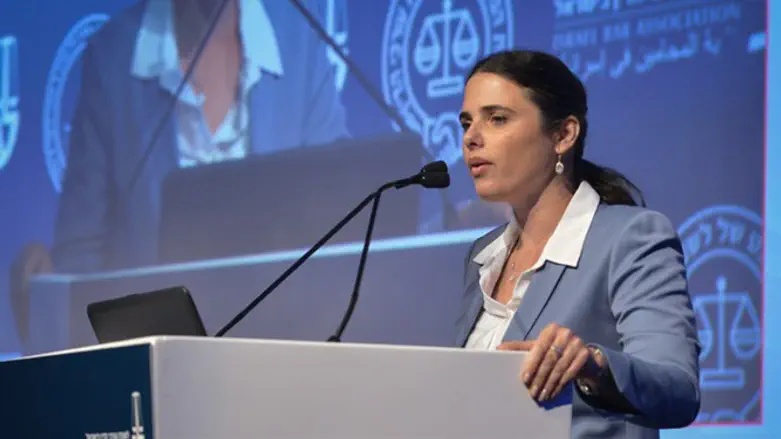
Justice Minister Ayelet Shaked spoke today (Tuesday) at the opening of the Israel Bar Association conference opening the judicial calendar held at the David Intercontinental Hotel.
The Minister opened her remarks and said: "In Israel of 2017, a state whose legal regime is a tangle of individual rights with no reference to its basic laws as the nation-state of the Jewish people, Zionism has become a legal dead zone.Questions about it are irrelevant. National challenges are a legal blind spot, which, according to the accepted view today, should not be taken into account, certainly not to decide when questions are raised concerning the individual.
"The question of the Jewish majority is never relevant. It is irrelevant when we talk about African infiltrators who settled in south Tel Aviv and established a city within a city while pushing aside the neighborhood's residents, and the response of the Israeli legal system is repeated disenabling of the law that seeks to deal with the phenomenon. It may be that had the Zionist idea been situated in a real way on the table, yesterday's ruling may have looked different.
"Zionism is also irrelevant when a long-standing mission like the Judaization of the Galilee, which has accompanied us since Zionism's inception, is abandoned in the Kadan judgment (where the Supreme Court ruled that the policy of leasing land to Jews only constitutes prohibited discrimination), all in the name of a system of protecting individual rights," Shaked added.
The Minister emphasized: "The system of individual rights in Israel is something that is almost sacred to me, but not when it is disassociated from all context, not when it cuts itself off from Israeli uniqueness, our national missions, our identity, our history, our Zionist challenges. Zionism does not have to continue to universally bow its head to the explicit system of individual rights, and on the way be cut off from Knesset tradition and the legislative history that we all know. Since the rights revolution, we have stopped seeing ourselves as a community, as a body that is indeed made up of various different components, but has a national worldview and shared aspirations that unite it. We have lost the ability to say 'we'. Our national uniqueness has become a hollow symbol and an empty vessel - we have been fashioned as a system of millions of individuals.
"The legal system in Israel ceased at that hour to take part in the war for the very existence of the state and for the ability of the Jewish people to conduct community and state life. Only a moral and political revolution of a magnitude similar to that experienced in the 1990s, one that would reaffirm Zionism's achievements and its central positions since its inception can reverse the problematic trend," Shaked noted.
According to her, "The Basic Law that Israel, the nation-state of the Jewish people, which will be passed in the Knesset's next session, does exactly that: It is a comprehensive change, a moral and political revolution, a new paradigm for everything we have undergone in the past half-century.It transforms Zionism and the foundations of our most basic and deep identity from the dead ground of our legal system to their rightful place under the central spotlight.
"Rights will cease to be a matter imported here in crates that are unloaded from ships in the port according to pre-determined specifications in an unknown manner, according to an invitation that we, members of the Israeli Knesset, representatives of the public in Israel, have not issued. Fundamental rights will once again be a matter deeply rooted in our unique system.
"My aspiration is to see Israel as a strong and prosperous nation-state that fulfills its promise for the existence and success of the Jewish people, and on the other hand grants in practice all the individual rights to which it has committed itself in the Declaration of Independence, the most formative document of our nation, for all its citizens: Jews, Druze, Muslims, Christians, our obligation to which of course there is not, and can not be, a political dispute."